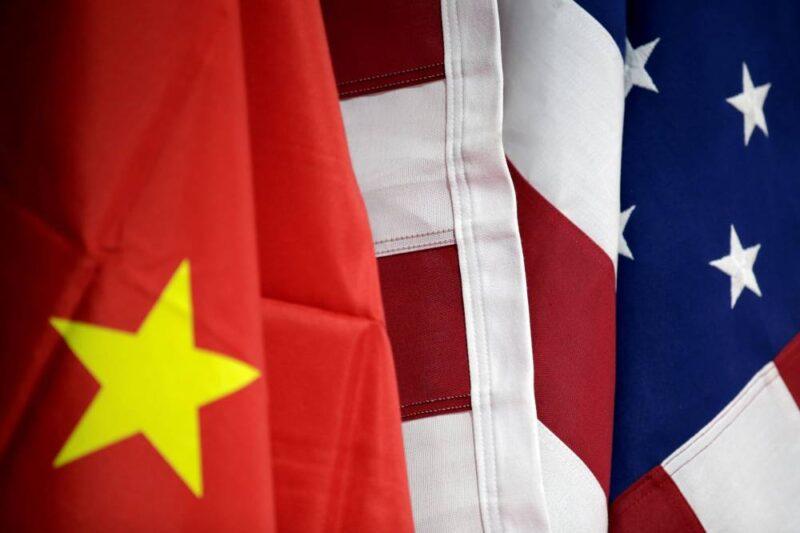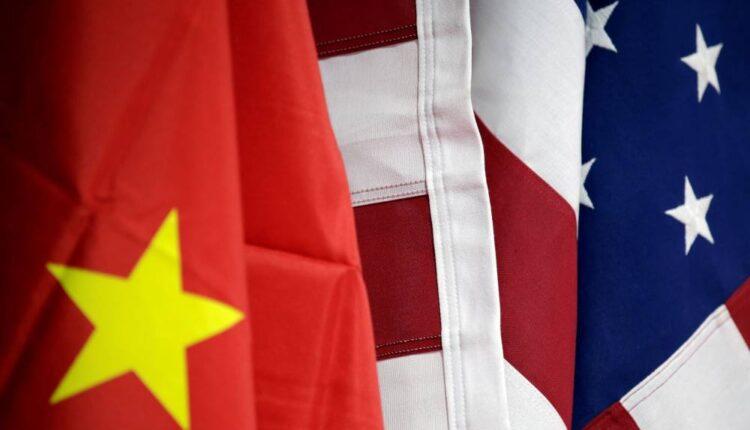
- Expanding U.S. tariffs of 25% to all trade with China could cost the U.S. $190 billion a year in GDP, according to a report released Wednesday by the U.S. Chamber of Commerce and Rhodium Group.
- If the U.S. is forced to sell half of its direct investments in China, that would cost American investors $25 billion a year in capital gains and up to $500 billion in GDP losses, the report said.
- U.S. businesses risk losing global competitiveness if sweeping policies force separation from China, the report said.
Flags of U.S. and China are displayed at American International Chamber of Commerce (AICC)'s booth during China International Fair for Trade in Services in Beijing, China, May 28, 2019.Jason Lee | Reuters
BEIJING — The U.S. economy could lose more than $1 trillion worth of production and long-term global competitiveness if the White House pursues a sharp separation with China, according to a report released Wednesday by the U.S. Chamber of Commerce and Rhodium Group.
As U.S. President Joe Biden looks set to retain his predecessor's tough stance on China, the authors of the report laid out estimates for the enormous costs of sweeping — rather than targeted — policies to protect U.S. national security from Beijing's growing economic and technological clout.
These projected losses include:
- By 2025, $190 billion a year in in U.S. output by expanding 25% tariffs to all trade with China. In the coming decade, full implementation of such tariffs would cause the U.S. to fall $1 trillion short of potential growth.
- Up to $500 billion in one-time GDP losses if the U.S. sells half of its direct investment in China. American investors would also lose $25 billion a year in capital gains.
- $15 billion to $30 billion a year in exported services trade if Chinese tourism and education spending falls to half of what it was prior to the coronavirus pandemic.
Research for the 92-page report began in 2019, before the coronavirus pandemic hammered the global economy.
Tensions between the U.S. and China escalated in the last three years under former President Donald Trump. His administration sought to use tariffs, sanctions and greater scrutiny of cross-border financial flows to address longstanding complaints about China's lack of intellectual property protections, forced technology transfers and significant role of the state in business operations.
Losing out on global competitiveness
The costs of the world's two largest economies separating range far beyond immediate dollar figures.
Sweeping U.S. policies directed at China will also affect other countries, forcing them to reconsider their relationships with the U.S., the report said. It added that these moves will increase costs for American businesses and reduce their ability to compete globally.
The report looked specifically at the impact of wide-ranging White House policy in the aviation, semiconductor, chemicals and medical devices industries. For example, losing out on China's massive market for airplanes could cost the U.S. $875 billion by 2038, according to the authors' analysis.
VIDEO2:1202:12China focuses on ramping up domestic chip industry amid shortageThe Exchange
To address national security goals, the report said the U.S. government should pursue "narrowly tailored actions" such as restrictions on the export of specific technology licenses.
Cutting U.S. businesses off from the Chinese market completely will likely have greater consequences for America's global leadership in the long term, the report said.
"It is critical that U.S. chip firms retain access to the Chinese market and are able to reinvest revenues from their China sales back into U.S.- based chip production and R&D to maintain their global leadership position, enabling the U.S. to set the standards for the future."
Ultimately, successful U.S.-China policy will have its costs and require some painful adjustments, the report said.
"In the policy reengineering to come," the report said, "the central role of market forces in determining winners, and the finite capacity of governments to redistribute resources to ease the process, must be respected."
Source: cnbc.com

